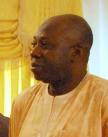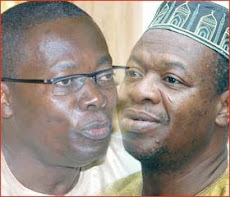*Wanton Negligence and Grand Conflict Of Interest At Play In Officialdom *
Months of investigation has revealed traces of negligence and conflict of interest on the part of officialdom resulting in Ghana losing millions of US dollars over the sale of the Ghana Bauxite Company Limited (GBCL) to Bosai Minerals Group; a Chinese company.
The Chinese are already in the Western Region with their ships carting away huge tons of the nation’s bauxite, despite conflicting figures on the value of the transaction.
Preliminary findings by The Herald put the country’s loss close to $20 million from the sale of 80 per cent shares of TBAC ; majority shareholders -previously British Aluminum Company - to the Chinese group.
While the British group, based in Ireland, told Ghanaian officials that their 704,204 shares of Ghana Bauxite were being sold to the Chinese for US$10, 620 million, the Chinese on the other and were busily announcing that they were rather paying US$30 million for the minerals.
But in spite of these clear conflicting figures, both the Ministry of Lands and Natural Resources and the Minerals Commission have allowed the Chinese into the country and they are briskly siphoning Ghana’s bauxite to China with ships in apparent violation of constitutional provisions which is strict on a parliamentary approval of such transaction (Articles 268 and 269).
This reporter also discovered that the Natural Resources Ministry failed to exercise its oversight responsibility over the 20 percent shares in Ghana Bauxite hence left the British in cohort with their Ghanaian counterparts such as Fred Ohene-Kena, E. Appiah Korang,E. A. Sackey and B. Ackaah Gyasi who determine the share purchase price.
Players in the Aluminum industry told this reporter that with value of aluminum rising daily, Ghana could have reaped a fortune from the sale had the ministry been part of the evaluation of shares, especially taking into account the fact that the British has since 1997, not paid government any dividend.
Interesting discoveries made by The Herald revealed that Guinea Conakry, the world's number one source of bauxite got about US$1 billion on its extraction, while Guyana and Australia, where TBAC operates under the name Rio Tinto have all made fortunes out of the extraction of the aluminum ore, and Ghana remains the only country which is losing out.
*Fred Ohene-Kena’s Conflict of Interest *
In the center of the deal is no less a person that the chairman of the Minerals Commission, Mr. Fred Ohene-Kena, who incidentally doubles as a director of Ghana Bauxite; a clear case of conflict of interest.
A letter dated September 25, 2009 and sent to the Minister of Lands and Natural Resources, Alhaji Collins Dauda, and copied to the Minerals Commission boss, Mr. Ben Aryee, bears Mr. Ohene-Kena’s name as one of the directors of the British company.
He is mentioned within government circles to have lobbied for a quick approval for the Chinese to take over the concession, despite the conflicting figures.
Mr. Ohene-Kena, sometime last year, admitted in an interview with this reporter who was then working with The Enquirer that he pushed for the transaction to go through, even though, personally, he had no knowledge at all of the price the mine was being sold to the Chinese.
The former minister at the time insisted he was pushing for the sale of the mine to the Chinese in “the national interest” since there is an imminent closure of the mine if the shares are not offloaded to the Chinese on time.
He disclosed that, as the chairman of the Minerals Commission, he informed the Minister of Lands and Natural Resources about the interest of Bosai Minerals, and got Alhaji Collins Dauda to obtain cabinet’s approval for it to be sent to parliament, but a difficulty pertaining to the under-invoicing came up against the company so the deal has hit a snag.
According to him, Ghana Bauxite has had some turbulent years, as the result of poor rail infrastructure, hence it was unable to haul huge quantities of the bauxite it had wanted to. This, according to him, explains why the company has not been able to pay government its dividend for some years now. He said the Chinese have indicated their preparedness to improve upon the rail infrastructure in the mine area, and to him “this is good for the economy.”
*Fraudulent Acts Of TBAC *
According to information gathered by this paper, the Ghana Bauxite published in their audited account that they had incurred a loss of US$7.335 million during the year ended 31st December 2008, and, as of date, its liabilities exceeded its assets by US$16,913. Consequently, they had to obtain a loan of US$10.5 million funding from their parent company to support the operations of the company for the year ended 2009.
Meanwhile at the time when the TBAC took over the management of the company, the assets of the company exceeded the liability by US$4,120,000. However, by December 31, 2008, its liabilities exceeded its assets by US$16,913 million as a result of mismanagement.
As proof of the unprofitable operations of the company, TBAC sought for a US$10 million to support the operations of GBC from their parent company.
To conceal the fraudulent activities, the company failed to comply with the provisions of Section 122(7) of the Companies Code by consistently not filing the Annual Returns and had therefore been suppressing revenue from the export of bauxite.
Further investigations reveal that TBAC sells and fixes prices of products for export to themselves through the use of Alcan Trading Limited, one of the outlets of Rio Tinto group of companies of which TBAC is a member. This way, TBAC through Alcan Trading Limited, re-invoices sales parcels to third parties in contravention of Ghana’s Exchange Control Laws.
Notably, whereas by Article 10 of a Bauxite Sale Contract between the Government of Ghana and TBAC provided that the price at which bauxite is to be sold shall be calculated on a quarterly basis and to be determined by reference to the London Metal Exchange (LME), Rio Tinto Alcan, the parent company of TBAC has executed an agreement with Bosai to produce and sell to them 600,000 tons of bauxite per annum at a fixed price of US$30.00 per metric ton for the next three years, with export contracts on behalf of GBC signed on its behalf by officers of Alcan Chemicals Europe based in Ireland.
More interestingly, Alcan Chemicals, the principal buyers of GBC’s ore, apart from buying for its own use, buys the ore and re-invoices the third parties using the true market price.
The Chinese are already in the Western Region with their ships carting away huge tons of the nation’s bauxite, despite conflicting figures on the value of the transaction.
Preliminary findings by The Herald put the country’s loss close to $20 million from the sale of 80 per cent shares of TBAC ; majority shareholders -previously British Aluminum Company - to the Chinese group.
While the British group, based in Ireland, told Ghanaian officials that their 704,204 shares of Ghana Bauxite were being sold to the Chinese for US$10, 620 million, the Chinese on the other and were busily announcing that they were rather paying US$30 million for the minerals.
But in spite of these clear conflicting figures, both the Ministry of Lands and Natural Resources and the Minerals Commission have allowed the Chinese into the country and they are briskly siphoning Ghana’s bauxite to China with ships in apparent violation of constitutional provisions which is strict on a parliamentary approval of such transaction (Articles 268 and 269).
This reporter also discovered that the Natural Resources Ministry failed to exercise its oversight responsibility over the 20 percent shares in Ghana Bauxite hence left the British in cohort with their Ghanaian counterparts such as Fred Ohene-Kena, E. Appiah Korang,E. A. Sackey and B. Ackaah Gyasi who determine the share purchase price.
Players in the Aluminum industry told this reporter that with value of aluminum rising daily, Ghana could have reaped a fortune from the sale had the ministry been part of the evaluation of shares, especially taking into account the fact that the British has since 1997, not paid government any dividend.
Interesting discoveries made by The Herald revealed that Guinea Conakry, the world's number one source of bauxite got about US$1 billion on its extraction, while Guyana and Australia, where TBAC operates under the name Rio Tinto have all made fortunes out of the extraction of the aluminum ore, and Ghana remains the only country which is losing out.
*Fred Ohene-Kena’s Conflict of Interest *
In the center of the deal is no less a person that the chairman of the Minerals Commission, Mr. Fred Ohene-Kena, who incidentally doubles as a director of Ghana Bauxite; a clear case of conflict of interest.
A letter dated September 25, 2009 and sent to the Minister of Lands and Natural Resources, Alhaji Collins Dauda, and copied to the Minerals Commission boss, Mr. Ben Aryee, bears Mr. Ohene-Kena’s name as one of the directors of the British company.
He is mentioned within government circles to have lobbied for a quick approval for the Chinese to take over the concession, despite the conflicting figures.
Mr. Ohene-Kena, sometime last year, admitted in an interview with this reporter who was then working with The Enquirer that he pushed for the transaction to go through, even though, personally, he had no knowledge at all of the price the mine was being sold to the Chinese.
The former minister at the time insisted he was pushing for the sale of the mine to the Chinese in “the national interest” since there is an imminent closure of the mine if the shares are not offloaded to the Chinese on time.
He disclosed that, as the chairman of the Minerals Commission, he informed the Minister of Lands and Natural Resources about the interest of Bosai Minerals, and got Alhaji Collins Dauda to obtain cabinet’s approval for it to be sent to parliament, but a difficulty pertaining to the under-invoicing came up against the company so the deal has hit a snag.
According to him, Ghana Bauxite has had some turbulent years, as the result of poor rail infrastructure, hence it was unable to haul huge quantities of the bauxite it had wanted to. This, according to him, explains why the company has not been able to pay government its dividend for some years now. He said the Chinese have indicated their preparedness to improve upon the rail infrastructure in the mine area, and to him “this is good for the economy.”
*Fraudulent Acts Of TBAC *
According to information gathered by this paper, the Ghana Bauxite published in their audited account that they had incurred a loss of US$7.335 million during the year ended 31st December 2008, and, as of date, its liabilities exceeded its assets by US$16,913. Consequently, they had to obtain a loan of US$10.5 million funding from their parent company to support the operations of the company for the year ended 2009.
Meanwhile at the time when the TBAC took over the management of the company, the assets of the company exceeded the liability by US$4,120,000. However, by December 31, 2008, its liabilities exceeded its assets by US$16,913 million as a result of mismanagement.
As proof of the unprofitable operations of the company, TBAC sought for a US$10 million to support the operations of GBC from their parent company.
To conceal the fraudulent activities, the company failed to comply with the provisions of Section 122(7) of the Companies Code by consistently not filing the Annual Returns and had therefore been suppressing revenue from the export of bauxite.
Further investigations reveal that TBAC sells and fixes prices of products for export to themselves through the use of Alcan Trading Limited, one of the outlets of Rio Tinto group of companies of which TBAC is a member. This way, TBAC through Alcan Trading Limited, re-invoices sales parcels to third parties in contravention of Ghana’s Exchange Control Laws.
Notably, whereas by Article 10 of a Bauxite Sale Contract between the Government of Ghana and TBAC provided that the price at which bauxite is to be sold shall be calculated on a quarterly basis and to be determined by reference to the London Metal Exchange (LME), Rio Tinto Alcan, the parent company of TBAC has executed an agreement with Bosai to produce and sell to them 600,000 tons of bauxite per annum at a fixed price of US$30.00 per metric ton for the next three years, with export contracts on behalf of GBC signed on its behalf by officers of Alcan Chemicals Europe based in Ireland.
More interestingly, Alcan Chemicals, the principal buyers of GBC’s ore, apart from buying for its own use, buys the ore and re-invoices the third parties using the true market price.
Source: By Larry-Alans Dogbey














No comments:
Post a Comment